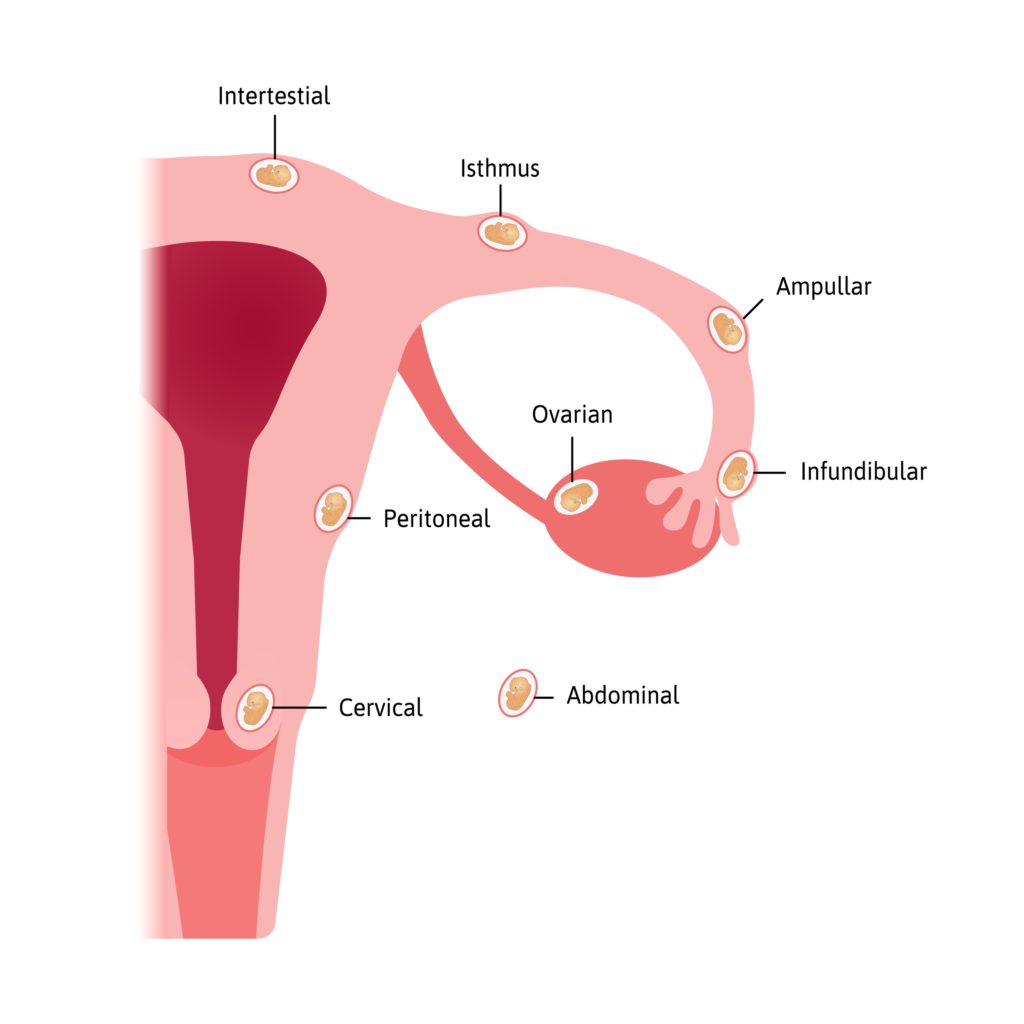Hauwa started feeling the pain in her tummy two days ago. It started as a dull, ache. It gradually got worse even after taking some tablets of over the counter medication.
Her period was two weeks late.
She hadn’t given it much thought until now, although questions like “Could I be pregnant? I have some of the signs kept on popping up.
What’s causing this pain and why wouldn’t it go away?” Eventually, she decided to visit the general hospital near her house.

During the consultation, the gynaecologist asked a number of questions. One of which was, “Had she any history of Sexually Transmitted Infection?” to which she affirmed. She explained that she was prescribed antibiotics. However, this was after several weeks of failed self-medication and worsening symptoms.
The doctor examined Hauwa. Furthermore, she asked her to get a pregnancy test and ultrasound scan done immediately. The pregnancy test came in positive but the ultrasound showed an empty womb! Where then was this pregnancy?
After a detailed search, an abnormal sac was found close to her ovary. There was a heartbeat.
The diagnosis was a ruptured Ectopic Pregnancy.
Hauwa was truly pregnant but the pregnancy was not in her womb!
What’s An Ectopic Pregnancy?
From double lines on test strips to early morning nausea. From missed periods to positive blood tests. The news of conception is one that is often wrought with mixed feelings. In some cases, tears of joy, in others, absolute shock and disappointment.

Source: Shutterstock
Regardless of the mode of reception, conception has occurred and more often than not, the fertilized egg has attached to the mother’s womb before she is even aware of it. This attachment provides a means for the growing baby to get the oxygen and nourishment necessary for its survival.
Any pregnancy in which this physical connection, between mother and child, occurs in any other site outside the womb is regarded as an Ectopic Pregnancy.
The most common site of ectopic pregnancy occurrence is the fallopian tube. Other less common sites include the ovary and the abdominal cavity.
Causes & Sites
Ectopic Pregnancies are caused by any factor which prevents or causes a delayed transport of the fertilized egg through the fallopian tube. This leading to its attachment to the any part of the abdomen, ovaries, various parts of the fallopian tube, or cervix instead of the womb.
These factors may be inherited from parents or acquired at a point during a woman’s life.
Some of these factors include:
- Complications of sexually transmitted diseases (STIs) (e.g Pelvic Inflammatory Disease),
- Masses or tumours of the ovary
- Poorly done abortions
- Smoking
- Fertility treatments and
- Previous ectopic pregnancies.

What Does It Feel Like To Have An Ectopic Pregnancy?
In Nigeria, Ectopic Pregnancies make up 2-5% of all women’s health related emergencies. This statistic rises with every day. As it is with some health conditions, ectopic pregnancies don’t show symptoms till a rupture happens.
The common warning signs of an ectopic pregnancy are:
- light vaginal bleeding
- lower abdominal pain.
As the pregnancy goes on, other observable symptoms like:
- Observing you have missed your menstrual period
- A swelling in your tummy may occur
In extreme situations of tubal pregnancy, the tubes may rupture, resulting in heavy bleeding. Other symptoms of this life-threatening situation may include lightheadedness, fainting spells and shock.
Is It Preventable?
It is essential to note that depending on the location, an ectopic pregnancy cannot proceed normally. In fact, the embryo cannot survive and the growing tissue may result in life-threatening bleeding if left untreated.
As a precaution for mums, it is advisable to conduct a scan. This determines the actual pregnancy site, especially if you have a history of ectopic pregnancy.
There is no hard and fast rule for prevention. The key to reducing its incidence lies in reducing the risk factors. Certain practices that have proven to be effective include:
Safe Abortion Practices
This serves to reduce the risk of an infection occurring after an abortion procedure. Whenever an abortion is necessary, a government certified hospital with qualified medical personnel is the best option.
Safe Sexual Behavior
Limiting the number of sexual partners and proper contraceptive education/use would help women like Hauwa reduce the risk of contracting certain STIs which may eventually result in Pelvic Inflammatory Diseases that can increase the chances of an Ectopic Pregnancy.
Safe Contraception
Every woman who aims to reduce her predisposition to ectopic pregnancies should consult qualified gynaecologists before selecting a plan. Furthermore, progesterone-only pills, as well as Intra-Uterine Devices (IUDs) may increase the risk of Ectopic Pregnancies.
Lifestyle Modifications
Smoking has been observed to increase the risk of an ectopic pregnancy by up to four times. Therefore, women of reproductive age (12- 51 years) are advised to refrain from smoking2.
Seeking Medical Care Early
When infections arise, women are advised to promptly seek proper medical care. Proper treatment would ensure that the risk of a recurrence is minimal and the threat of an ectopic pregnancy in the future is greatly reduced.
Can Ectopic Pregnancies Be Managed?
An ectopic pregnancy, especially in the fallopian tube, is an emergency. Most ectopic sites are not wired to house and sustain a growing baby. If left undetected, it can rupture and cause heavy internal bleeding. This is totally different from threatened abortion.
Although it can lead to death in severe cases. Once discovered, the way Hauwa’s condition will be handled depends on the stage of the pregnancy as well as her physical condition at the time of diagnosis.
The most probable options include medical management with the administration of abortion medications, like Trophotoxics, at the site of the ectopic pregnancy. In addition to this, surgery might be required, especially in severe cases. Depending on the location of the pregnancy, a damaged ovary or tube may be removed.
You are not alone in this
Sadly, this condition is not unique to Hauwa, as a number of women in our society suffer this from time to time. In most cases, the pain is obvious to the people around them and family and friends may be at loss for what to do and how to help.
Therefore, everyone needs to have information on how to handle this situation as it takes a great toll on the emotional and mental health status of an affected woman.
Fortunately, a diagnosis of Ectopic Pregnancy is not a death sentence if discovered on time. With one tube and ovary you will still go on to have pregnancies in future .
References
- Abdulkareem, Talal & Eidan, Sajeda. (2017). Ectopic Pregnancy: Diagnosis, Prevention and Management. 10.5772/intechopen.71999.
- Deborah Weatherspoon 2019, What Causes Upper Stomach Pain, Medical News Today, Viewed on 26 May, 2020, <https://www.medicalnewstoday.com/articles/324591>.
- Royal College of Obstetricians and Gynaecologists 2020, Ectopic Pregnancy, Royal College of Obstetricians and Gynaecologists, Viewed on 26 May, 2020, <https://www.rcog.org.uk/en/patients/patient-leaflets/ectopic-pregnancy/>.
- Taran, Florin-Andrei & Kagan, Karl & Hoopmann, Markus & Wallwiener, Dr. Diethelm & Brucker, Sara & Huebner, Markus. (2015). The Diagnosis and Treatment of Ectopic Pregnancy. 10.15496/publikation-11970.

